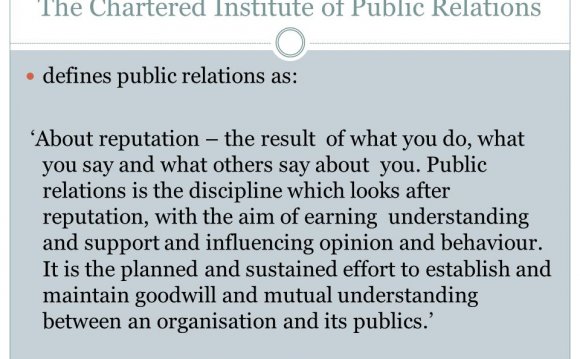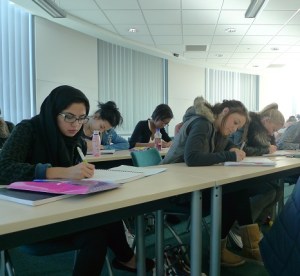
 It’s that time of the year again. New students are embarking on new courses, full of expectations. Yet this most obvious of questions is not that easy to answer.
It’s that time of the year again. New students are embarking on new courses, full of expectations. Yet this most obvious of questions is not that easy to answer.
I’ve put this question to my first year PR students.
They, remember, are the first year to be taking on greatly increased levels of debt to attend university.
So it seems an important question to address early on in their studies.
Their answers interspersed below broadly fit in to two areas. The first is vocational (or, if you’re an academic, instrumental).
Students tell me they’re studying PR because it’s an exciting field they hope to work in.
At first glance, this is a good reason. At a time of global recession, and with high levels of youth unemployment, it makes sense to ensure you will be employable at the end of your studies, and in a field where you have a realistic hope of repaying your debts.
“It’s an interesting subject about an exciting and expanding industry, with lots of opportunities for university graduates.” Kate O’Donnell
Last year’s new graduates were in many cases already working full time by the time of our graduation ceremony in July.
If they weren’t working in conventional public relations roles, then they had started working in hybrid digital marketing agencies.
In other words, there seem to be good prospects for PR graduates and industry change is creating new roles and opportunities for adaptable and ambitious young people.
But university is different from a training course.
While your course may cover the practicalities (such as writing and presentation skills), it probably won’t give you the most up-to-date lessons in media relations or digital skills (eg search engine optimisation).
It can’t: an undergraduate starting now may not graduate until 2016 – by which time the (digital) media landscape will be very different.
“PR allows me to be creative and use my writing skills, but with more chance of a job at the end than a degree in something such as journalism.” Ruth Wilson
Training is a by-product of a university course in public relations, but the course has a slightly different purpose.
The world is changing, so I need to study change.
The second group of first year students appear to recognise that they’re growing up in a world of increasing complexity. They told me about rapid change and of uncertainty.
“The world will never be short of problems, and therefore never short of a need for PR.” Niamh Spracklen
And, in similar vein:
“You tell me someone who doesn’t need PR and I’ll tell you why NOT to study PR.” Georgia Robson
 It’s the complexity of the business, political and media landscapes that creates demand for problem-solving graduates. Complexity brings risk. Risk to reputation is one of the drivers behind growth in the international public relations business and people capable of coping with risk and complexity are needed.
It’s the complexity of the business, political and media landscapes that creates demand for problem-solving graduates. Complexity brings risk. Risk to reputation is one of the drivers behind growth in the international public relations business and people capable of coping with risk and complexity are needed.
“To become one of the few individuals with an accurate and rounded view of the world, who can bring something to every industry.” Cheryl Pearce
I can’t know exactly what tools you’ll be using in five or ten years time (a limitation of the skills approach mentioned above) – but I can know that you’ll be facing complex problems. Education, with its progressive problem-solving, should be a good preparation for the world of work.
“PR is a non-linear, open-ended subject that encompasses psychology, maths, English, the lot. What other degree offers so much?” Jack Clark
Some students are ready to embrace critical perspectives on public relations.
“PR is a fundamental function of any modern business. It can affect all aspects of a company’s function and therefore without acknowledging its importance we run the risk of letting it consume us.” Nick Horbowyj
Employers do not hire graduates for what they’ve learnt in the past. They hire them for their potential to learn in future. A degree does not guarantee you a job, but it helps get you the interview and so gives you an opportunity to impress and succeed.
In this analysis, learning is not a means to an end (knowledge), but rather a process of problem-solving. It shows your potential. It should help make you future-proof.
“Not only is PR a growing industry and so broad, but it’s a practical course that can offer invaluable work experience and life skills. It’s great fun too!” Emily Morris
I study because it’s interesting
In a world of high fees, few volunteered this approach (it sounds old-fashioned and rather dilettante). But if employers are picking you for your potential, not for what you’ve learnt, then to some extent it doesn’t matter what you’ve chosen to study. What matters is the passion you’re able to bring to (or get out of) your subject.
“I come away from university every day feeling like nothing else is as inspiring as what I’ve learnt that day.” Bethany Simpson
What matters too is the adaptability of a good graduate.
“It is a broad, exciting subject. It keeps you on your toes and you find yourself thinking of new ambitions every day, keeping you motivated.” Ghislaine Aldred
Public relations may not sound like a ‘hard’ choice at university (some assume it’s an easy course). Yet if you can demonstrate your interest in those forces that are transforming the business and media environments, and your interest in the relationship between communication and society, then someone will probably take an interest in you.
Traffic stats













